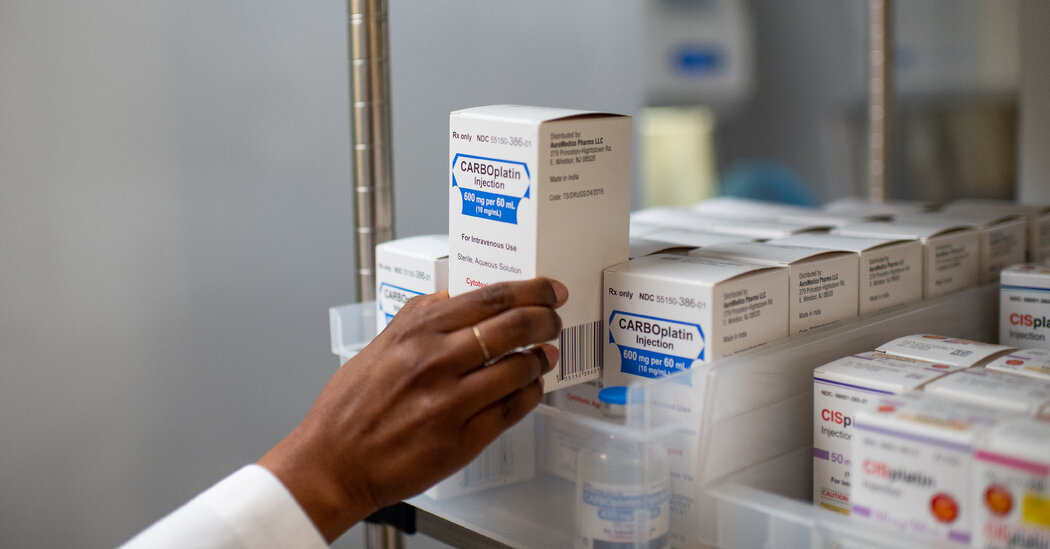The Federal Trade Commission and the Department of Health and Human Services announced Wednesday that they will investigate the causes of generic drug shortages and the practices of “powerful intermediaries” involved in the supply chain.
The federal agency’s investigation targets group purchasing organizations and drug distributors, which have been in the spotlight in recent months as drug shortages reached a 10-year peak. Authorities want to investigate the companies’ influence on how medicines are sold to hospitals and other medical facilities and assess whether intermediaries put pressure on pricing or manufacturing, leading to breakdowns.
At a Congressional hearing last year, oncology experts testified about the impact of the shortage and described the difficult decisions that forced them to ration key chemotherapy drugs. They detailed monthly and even weekly supply shortages that pose a deadly risk for some patients.
“For years, Americans have faced severe shortages of critical medicines, from chemotherapy to antibiotics, putting patients at risk,” FTC Chair Lina Khan said in a statement. . “Our investigation is seeking information on the factors causing these shortages and is scrutinizing the actions of opaque drug intermediaries.”
In previous interviews with the Times, generic drug industry executives expressed serious concerns about their reliance on three large group purchasing organizations for contracts to sell drugs to hospital and health center customers. was. Generic company executives sometimes offer below-market prices to help their companies win large contracts, a strategy that is used by manufacturers of sterile injectables frequently used in surgical and cancer treatments. They complained that the stability of the system was being compromised.
Lawmakers have expressed similar concerns. Late last year, Sen. Ron Wyden, an Oregon Democrat and chairman of the Senate Finance Committee, criticized the generic drug industry’s “very powerful medical intermediaries.” Last month, he and Sen. Mike Crapo, R-Idaho, outlined Examines ways to limit drug shortages and focuses in part on proposed changes to Medicare payments for sterile injectable drugs.
Dr. Robert Calif, head of the Food and Drug Administration, testified before Congress last year about the limits of the agency’s ability to manage drug shortages, pointing to market dynamics such as low prices and falling prices in the generic drug industry.
Chemotherapy drug shortages have been making headlines for lawmakers and the pharmaceutical industry. Cancer experts have been forced to create treatment guidelines that recommend small doses for patients with a chance of cure, but deny them to patients with metastatic disease who want to live longer. ing.
The key chemotherapy drugs in short supply, cisplatin and carboplatin, are essential in the treatment of lung, breast, testicular, ovarian, and head and neck cancers. In recent years, prices for both drugs have fallen to about $15 to $20 per dose, even as India-based drug company Intas Pharmaceuticals has increased market share.
Intas suspended production of the drug after unannounced FDA inspections in late 2022 raised quality concerns. The result is widespread shortages, which generic drug industry executives say is an example of falling prices and winner-take-all deals increasing reliance on fewer drugs. Pharmaceutical company.
The FTC’s investigation, announced Wednesday, focuses on whether concentration among intermediaries in the pharmaceutical industry “prevents suppliers from competing in the generic drug market.”The agency is accepting public comment As part of an investigation into the shortage.
The Accessible Drug Association, a trade group for the generic drug industry, applauded the FTC’s efforts to address the issue. In a statement, the group’s interim chairman, David Goh, said it was important for the agency to look at lower prices for generic drugs, increased concentration on intermediaries and fewer manufacturing sites.
“As a result of all this, the risk of drug shortages will only increase unless action is taken to strengthen the long-term sustainability of generic manufacturing,” Go said in a statement.
The federal investigation is expected to look into three major group purchasing organizations that contract with generic drug manufacturers to supply drugs to hundreds of customers. Todd Evert, president of the Healthcare Supply Chain Association, which represents the joint purchasers, said the companies will not only provide hospitals and other health care providers with competitive prices, but also reliable drug supplies. He said he is doing so.
“GPO is helping to stabilize the generic drug market by working with manufacturers on agreements that provide the certainty and predictable demand they need to remain on the market,” Evert said in a statement. . He added that the organization “looks forward to sharing further with the FTC about GPO’s important role in addressing the ongoing drug shortage crisis.”
John Parker, a spokesman for the Healthcare Distributors Alliance, which represents major companies such as McKesson, Cardinal Health and AmerisourceBergen, said the organization assesses drug shipping fees to generic drug manufacturers. The group said it was aware of the agency’s request for information and would provide it. I will tell them about that outlook at a later date.
